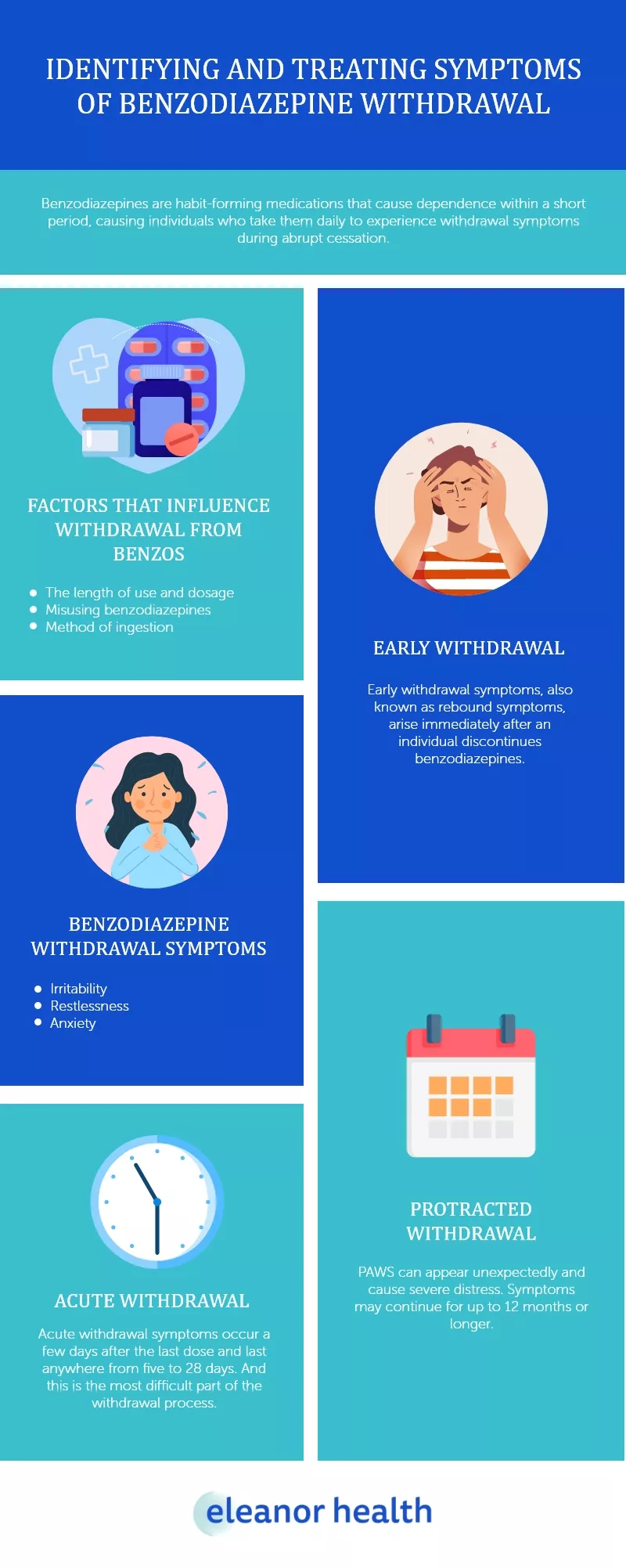Benzodiazepines are central nervous system depressants approved by the FDA to treat anxiety, insomnia, and seizures. They are also commonly prescribed by doctors for treating off-label conditions such as acute alcohol withdrawal, bipolar disorder, and tic disorder. Benzodiazepines are considered safe and effective when used for a short period of 2-4 weeks. Prolonged use of benzos has been associated with the development of tolerance, dependence, addiction, and other negative effects.
Benzodiazepines are among the most commonly prescribed medications in the U.S. According to a report published by the Centers for Disease Control and Prevention (CDC), benzodiazepines were prescribed at around 66 million doctor’s visits a year from 2014 to 2016. Benzodiazepines are habit-forming medications that cause dependence within a short period, causing individuals who take them daily to experience withdrawal symptoms during abrupt cessation. Most withdrawal symptoms begin within 24 hours after the final dose and can last from a few days to several months, depending on several factors.
Withdrawal symptoms from benzodiazepines can affect anyone who uses them, including those who have been prescribed them and those who have misused them without a prescription. The following factors increase the risk and the severity of withdrawal:
The length of use and dosage: Individuals who take benzos for several months or more at higher doses are more likely to experience withdrawal symptoms that last longer than those who take lower doses for a shorter period.
Misusing benzodiazepines: According to the National Institute on Drug Abuse (NIDA), benzos are addictive medications that increase the risk of misuse. And the misuse of benzos increases the potential for dependence and withdrawals.
Method of ingestion: The method of usage is often linked to the beginning of symptoms. For example, snorting or injecting benzos delivers the medications directly into the bloodstream, where they have an almost immediate effect. Ingesting a pill results in a less intense high and delayed symptoms.
Type of Benzodiazepine (short-acting or Long-acting): Short-acting benzos, such as Xanax, are considered more potent than longer-acting alternatives, such as Valium. Although withdrawal symptoms are similar in both cases, short-acting benzos can cause severe and quicker withdrawals. And since long-acting benzos last longer in the body, withdrawal symptoms are delayed.
Underlying mental or medical health issues: Individuals with pre-existing physical and psychological disorders are more likely to misuse medications. The misuse of benzos results in the development of tolerance, dependence, and withdrawals.
Mixing benzos with other substances: Benzodiazepine misuse also involves the use of benzos in combination with alcohol and other medications. This is referred to as poly-substance use, and it may affect the severity and timeline of withdrawal symptoms.
Benzodiazepines are generally not meant for long-term use. Long-term use and misuse of benzodiazepine can result in physically and mentally crippling withdrawal symptoms that can turn dangerous during abrupt cessation.
Benzodiazepine withdrawal syndrome can develop after as little as one month of use. Approximately 40% of those who take benzos for more than six months experience moderate to severe withdrawal symptoms when they abruptly stop taking them. The remaining 60% experience only minor symptoms.
The most common withdrawal symptoms include:
Benzodiazepine withdrawal may occur in three stages: early, acute, and protracted withdrawal.
Early withdrawal symptoms, also known as rebound symptoms, arise immediately after an individual discontinues benzodiazepines. During this withdrawal stage, the individual may notice the re-emergence of the condition benzos were initially prescribed to treat. For example, without medications, symptoms of anxiety or insomnia can return or get worse. Tapering down methods or other medications to aid with withdrawal symptoms can make early symptoms milder and more manageable.

Acute withdrawal symptoms occur a few days after the last dose and last anywhere from five to 28 days. And this is the most difficult part of the withdrawal process. Certain medications are utilized during the acute withdrawal phase to minimize the risk of relapse. Suicidal thoughts and behavior that may arise during the acute withdrawal stage can be addressed through therapy and support groups.
Protracted withdrawal, also known as post-acute withdrawal symptoms or PAWS, only affects certain individuals. If you have used benzos for longer than recommended, misused them, or formed an addiction, you are more likely to develop PAWS. Symptoms may continue for up to 12 months or longer. Paws include symptoms such as:
PAWS can appear unexpectedly and cause severe distress. Supportive counseling and other targeted therapies or medications can help individuals manage their symptoms and improve their quality of life.
Individuals who wish to stop using benzos are highly advised to seek assistance from a physician or addiction specialist before quitting. Detox at an inpatient setting is an ideal treatment option for individuals with:
Treatment options and coping strategies for benzo withdrawal include:
Medical detox: Medical detox can assist in the effective management of withdrawal symptoms. Medical monitoring allows physicians to react to possible withdrawal complications more quickly.
Tapering down method: When not handled properly, benzodiazepine withdrawal can be dangerous. People who stop using benzos without tapering (the gradual reduction of dosage) run the risk of life-threatening grand mal seizures, delirium, and hallucinations.
Other medications: If symptoms worsen or rebound symptoms occur, doctors can recommend alternative medications. For example, medications such as flumazenil (Romazicon) helps reverse the effects of benzodiazepine and buspirone (BuSpar) to treat severe anxiety.
Other therapies: Therapies, such as counseling and cognitive-behavioral therapy (CBT), can also help manage withdrawals.
Healthcare providers will assess the condition and recommend the right long-term treatment interventions to relieve symptoms and prevent relapses.
The risks of benzodiazepine withdrawal can be considerably decreased with the intervention of a physician or an addiction specialist. If you wish to stop taking benzos, first consult your doctor.
If you are seeking help with your loved one’s addiction, contact us today or complete our quick contact form below, to speak with an addiction treatment specialist.
If you need help with your substance use disorder, we are here to help you build your confidence and momentum towards the future you want. We provide treatment services for adults with alcohol, opioid, and other substance use disorders. We are currently located in Florida, Louisiana, Massachusetts, North Carolina, New Jersey, Ohio, Texas, and Washington.
Related Articles
 Dangers of Mixing Alcohol and Benzos
Dangers of Mixing Alcohol and Benzos
 What are Benzos?
What are Benzos?
 Medications for Anxiety and Depression: An Essential Medication Guide
Medications for Anxiety and Depression: An Essential Medication Guide